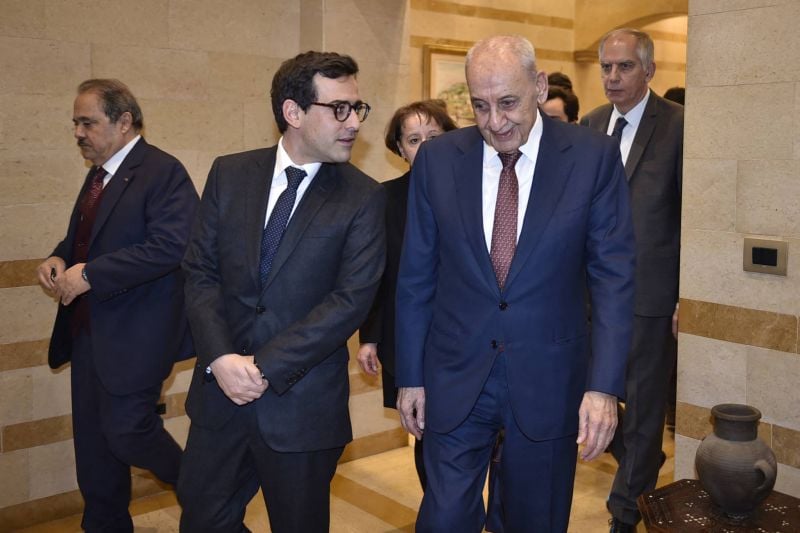
Lebanon's Parliament Speaker Nabih Berri (R) welcomes French Foreign Affairs Minister Stephane Sejourne at his residence in Beirut on Feb. 6, 2024. (Credit: AFP)
Want to get the Morning Brief by email? Click here to sign up.
Catch up on yesterday’s LIVE coverage of Day 123 of the Israel-Hamas war here.
Lebanese Foreign Minister Abdallah Bou Habib said French Foreign Minister Stephane Sejourne warned him that Israel could start a war with Lebanon in pursuit of the return of residents evacuated from the border region. Bou Habib restated Lebanon’s anti-war stance, calling for a border deal under the auspices of the United Nations, the US and France. Meanwhile, Hezbollah and Israel announced new cross-border strikes targeting each other’s military capacities.
Several homes in southern Lebanon have been damaged or demolished by Israeli attacks, including several deserted ones struck yesterday. While houses are empty after Israeli attacks displaced more than 86,000 people from border villages, such strikes have led to several casualties, both civilian and fighters. Residents in the Hasbaya district told L’Orient Today’s correspondent Israel bombed agricultural lands, raising the environmental toll imposed by Israel’s “scorched-earth policy,” as qualified by caretaker Environment Minister Nasser Yassin.
Lebanese Army retirees protesting low compensation blocked the entrance to the Beirut Port with burning tires and prevented entry to the TVA and Finance Ministry buildings, the state-run National News Agency (NNA) reported. The protesters demanded increased monthly wages and decried “discrimination” from the government. The NNA said the Beirut protests provoked severe traffic congestion, adding that a similar protest blocked roads in northern Lebanon. Lebanese Army retirees, and other public sector workers, regularly protest to demand improved compensation amid a fifth year of economic crisis during which their pay has continued to significantly lag behind triple-digit inflation.
In a note to Britain’s Ambassador to Lebanon, Caretaker Foreign Minister Abdallah Bou Habib expressed his discontent over an alleged snub from his British counterpart during a visit to Beirut last week, during which the two did not meet. A source close to the British Embassy told L’Orient Today that Britain’s top diplomat “hoped to see the foreign minister during their meeting with the PM but they understood this was not possible.” British Foreign Minister Lord David Cameron met with caretaker Prime Minister Najib Mikati, Parliamentary Speaker Nabih Berri and Lebanese Army commander Gen. Joseph Aoun. Cameron insisted on achieving “a long-term peace solution” beginning with the application of United Nations Security Council Resolution 1701 — which enshrined the terms ending the 2006 Hezbollah-Israel war, including the removal of non-state weapons from the Litani River to the Blue Line. The British Foreign Minister pledged $11 million in aid to Lebanon.
Lebanese diplomat, academic, and jurist Nawaf Salam was elected President of the International Court of Justice (ICJ). After being elected to the ICJ in 2018, Salam yesterday replaced American Judge Joan E. Donoghue for a three-year term leading the court. Born in 1953 into a prominent political family in Beirut, Salam was among the seventeen judges at the ICJ tasked with issuing the order following South Africa's genocide allegations against Israel, filed with the court in late December.
At least 27,585 people have been killed in Gaza since Oct .7, according to the latest figures from the enclave’s health ministry.
Despite “some comments,” Hamas gave a generally positive response for a hostage release agreement that would guarantee a pause in hostilities, announced Qatari Prime Minister Mohammed bin Abdulrahman Al-Thani during a press conference with US Secretary of State Antony Blinken. Hamas’s statement confirmed a “positive spirit” to the proposal, stating the group’s goals to guarantee a “definitive cease-fire” as well as “the arrival of aid, housing and reconstruction and the lifting of the blockade on the Gaza Strip.”
Blinken relayed Saudi Arabia’s “strong interest” in normalization with Israel granted the war in Gaza stops and that there is a “clear, credible timebound path to the establishment of a Palestinian state.”
The New York Times cited confidential Israeli intelligence claiming that at least 32 of the remaining 136 hostages captured by Hamas and other Palestinian militants on Oct. 7 have died since the start of the war.
Around 8,000 displaced people were evacuated from al-Amal Hospital in Khan Younis yesterday after the Israeli army’s two-week-long siege exposed it to several, sometimes deadly, strikes, said the Red Cross. The Israeli army has repeated its intention to push further to the southernmost city of Rafah, the terminal refuge for many Gazans already driven from refuge to refuge.
In case you missed it, here’s our must-read story from yesterday: “Unearthing history: Phoenician port of Sour rediscovered”
Compiled by Abbas Mahfouz